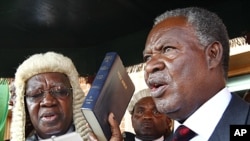Michael Sata, leader of the Patriotic Front party has been sworn in as Zambian president at a ceremony in the grounds of the Supreme Court in Lusaka. Sata won a decisive electoral victory over former president, Rupiah Banda of the Movement for Multiparty Democracy.
In his inaugural address to the country, President Sata returned to the themes of his election campaign - a recommitment to the rule of law, and fighting poverty and corruption, and said he planned to make a difference in these areas within 90 days.
Sata also promised Zambians that to cut government expenditures he would reduce the size of government.
Sata, who is Zambia’s fifth president since the country declared independence from Britain in 1964, was accompanied by his predecessor, Banda and the country’s founding president, Kenneth Kaunda. He was welcomed by thousands of slogan chanting party supporters who had travelled from across the country to witness the inauguration.
The victory by Sata and his Patriotic Front has ended two decades of rule by the Movement for Multiparty Democracy which came to power in the country’s first multiparty elections in 1991. Earlier former president Rupiah Banda addressed the nation to concede defeat and bid an emotional farewell.
“But now it is time for me to step aside. Now is the time for a new leader. My time is done. It is time for me for goodbye. May God watch over the Zambian people and may he bless our beautiful nation,” Banda said.
Banda thanked the Zambian people and said it had been a privilege and honor to serve them. But he said, it is now time for them to support the new president.
“I urge you all now to rally behind your new president. Yes our new president. Yes, we may have different ideas but we both want the same thing - a better Zambia. Now is not the time for violence and retribution. Now is the time to unite and build tomorrow’s Zambia together,” he said.
Many Zambians have hailed Banda’s “grace” in exiting office, and have said he is an example to other Africa leaders who refuse to recognize their electoral defeat.
Zambia’s currency, the Kwacha, tumbled to an all-time low of 5,030 to the dollar on the news of Sata’s victory. Financial analysts said this reflected uncertainty in the markets over Sata’s plans for the economy.
He campaigned on a pro-poor platform and has in the past fiercely criticized foreign, particularly Chinese, investment in the country's mining industry. Judy Smith-Höhn, senior researcher at the Institute for Security Studies said his rhetoric was at times xenophobic - and that he said he would tax foreign companies to fight poverty.
However Smith-Höhn says that in the past year this has changed, and that Sata began to speak instead of smart partnerships with Chinese and other foreign investors, and that his economic policy is unlikely to be greatly different from that of his predecessor.
“And it seems more likely you’re going have a continuation of the current more pragmatic, pragmatic economic policies that are being followed. And then also with continued strong involvement from foreign companies, like Chinese businesses,” she said.
Smith-Höhn said the Zambian economy will have to improve very significantly for to enable Sata to live up to his election promises and greatly reduce poverty in his country.
Michael Sata Sworn In as New Zambia President




